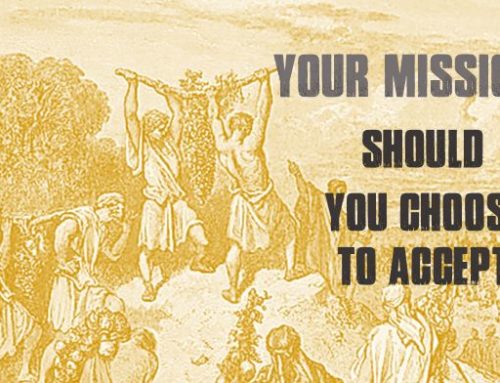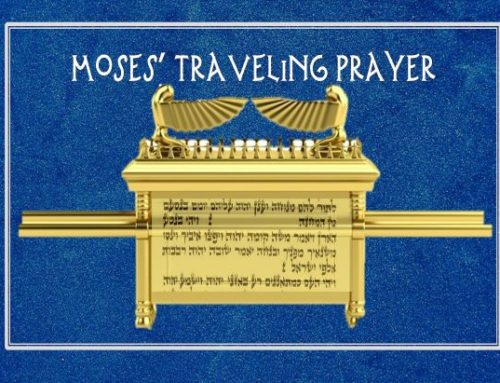Deut. 11: 26-16: 17, Isaiah 54: 11-55
“But you shall seek the place that the LORD you God will choose out of all your tribes to put his name and make his habitation there. There you shall go.” Deut. 12: 5
Have you ever been on a quest? Years ago, I stumbled into a quaint shop in the Jewish Quarter of old Jerusalem. Above the scarves and shofars hung a satellite map of the hills between Jerusalem and Shiloh. “Have you seen this?” The owner inquired. “From the vantage of space, one can see the name of God geologically carved into the mountains.” Joshua and Israel in our Torah Portion were on a quest to “the place” where God placed His name forever.
Moses commanded Joshua to see spiritually, seek the chosen place, and search for true worship. As generations passed, David continued the quest. In Jewish literature we are told of a conversation between the Prophet Samuel and David when both dwelled at Naioth. (I Sam. 19.18) Using Scriptural clues from Deuteronomy they are said to have determined the “chosen place” should be in the territory of Benjamin, and even the topography where the Temple should be built – “between two shoulders” – two hills. (See Bab. T. Zevachim 54b)
“Of Benjamin he said: “The beloved of the Lord shall dwell in safety by Him…And he shall dwell between His shoulders.” Deut. 33.12 NKJV
We too are on a quest to know God our Creator, to see, seek, and search for authentic faith. Moses instructions to Joshua form a good road map for our journey.
I. See with Spiritual Eyes
“See, I am setting before you today a blessing and a curse: the blessing if you listen to the commandment of the LORD your God, which I am commanding you today.” Deut. 11.26-27
Our Portion begins with the Hebrew command, Re’eh, meaning “see”. This journey required Israel to open their spiritual eyes to the prize and the pitfalls ahead. Interestingly, the name of our Parashah “Re’eh” was also a clue to the eventual chosen location. Abraham used the Hebrew verb for “seeing” to describe the mountain where the Temple would be built.
“And Abraham called the name of that place Jehovah–jireh: as it is said to this day, In the mount of the Lord it shall be seen.” Gen. 22.14 KJV
The Hebrew word, “Jirah”, (Yireh), means “He will see” or even “He (God) will be seen”. Some modern Jewish commentaries translate this as “in the mountain God will be seen”.
We must discern with spiritual eyes the journey before us. Messiah promised us that the Father would send us the Holy Spirit to come alongside, teach and remind us of the words of Yeshua. John 14.26 His indwelling presence gives discernment. Before embarking on business, education choices, or life decisions such as who to marry, we must open our eyes. Like Joshua, the Lord may only give us enough information to pursue His call, but not enough to answer all our questions. Along the journey, we are assured of His guidance. How wonderful it would be if we were given marked satellite maps. I am sure Joshua would have liked such a map. No, we walk by faith not by sight. We exercise our spiritual sight.
Now let us follow Joshua on his quest to “the chosen place” of authentic worship and relationship with God.
II. Seek the Chosen Place
“But you shall seek the place that the LORD your God will choose…” Deut. 12.5
Seven times Moses called “the place” chosen. (Deut. 12: 5, 11, 14, 18, 14: 24, 25, 15: 20, 16: 7) Though He did not reveal to Joshua the location itself, he did provide important clues:
- It would be in one of the tribal allotments, 12.5.
- God’s name will be there. 12.11,
- “Three times a year all your males shall appear (Yir’aeh) before the Lord your God in the place which He chooses…” 16.16 NKJV Yir’aeh – “shall appear”, is noted by some commentaries as a reference to Abraham’s name for the mountain– Yireh.
There is joy in the adventure following Messiah. Think of those who embarked on the quest for God’s perfect will.
- Abraham journeyed across Jordan following Adonai’s voice, leading him to Beth El, and finally the mountains of Moriah. The writer of Hebrews tells us that he was looking for a “City whose builder and maker is God”.
- Jacob made that same journey from Beth El to Beersheba. He dug a well in Shechem that provided Messiah’s great pulpit to preach to the people of Samaria.
- Many of you are also on this journey. From your place of comfort or perhaps discomfort, you heard the tug of God say, go. Like Joshua, you are seeking, walking, advancing toward the goal of the prize- the pearl of great price within the land of promise. That journey begins with knowing Yeshua, the Messiah. But be warned, there are dangers, and false temples along the way.
III. Search for True Worship
“Be careful that you do not offer your burnt offerings in every cultic place you see, but in the place which the LORD chooses…” Deut. 12.13-14
Israel journeyed to find the chosen place for the Tabernacle. It would take hundreds of years before the tabernacle was transformed to the Temple on Jerusalem’s Mt. Moriah. But Israel was not expected to wait along the journey to worship. They were to discern spiritually where to worship, not “in every cultic place”. Among the ancients it was customary to build temples over pagan sites. How can we apply Moses’ words today? Are we building worship and practice over “cultic” man-made faith? Or worse, are we syncretizing ungodly practices to our worship? Moses’ warning rings forth to today – “Be careful!”
Conclusion
“See, I am setting before you today a blessing and a curse…” Deut. 12.26
Some 1,900 years ago, around the year 100, Jewish believers in Yeshua wrote instructions to new believers coming to faith. Their words echo Moses, and reverberate to us through the ages.
“There are two ways: one of life and one of death; however, there is a great difference between the two ways…” Didache 1.1
Joshua’s journey began with the command to “see”. Two paths stand before each of us, and only two – one of blessings, one of curses. What path will we take? Abraham never found the city; his journey of authentic faith was the destination. He glimpsed in a vision the glory and suffering of Jerusalem’s “chosen place”, on Moriah – a place where the Temple would be built, destroyed, and rebuilt. In the place where Isaac was offered up in a figure, Messiah was offered as an atonement (kaparah) for sin. And to this place Messiah will one day return, as Abraham has said, “In the mountain God will be seen.” Joshua was not given all the answers, and the tabernacle was portable for a reason. On this quest of faith, may our eyes “see” clearly, our hearts seek earnestly, and our hands sanctify wholly our worship to the Lord. The LORD bless you this week out of Zion.
Shavua Tov





Thank you, Jack for this teaching about choosing. Informative. I love the part of the map with God’s name in the mountains. And it’s all about living with the consequences of our choices.